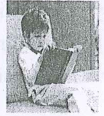阅读下面材料,在空白处填入适当的内容(1个单词)或括号内单词的正确形式。
A few months ago, my friend Henry and I planned to have a pizza at a restaurant in town. My dad kindly took us there his car. "I can come and get you," my dad said, "but don't call too late."
After finishing the meal at the restaurant, I decided (call)my dad. I entered my PIN(个人识别码), the phone didn't accept it: I got a wrong message. I tried again, but the same thing happened.
"This is strange," I said. I tried a third time. Unluckily, the phone became locked. I couldn't use it. I was a little (worry).
"It's OK, Emily. You can use my phone," said Henry.
Amazingly, the same thing happened to him. He tried three (time), but the PIN was wrong and his phone became locked, too. I wondered was wrong with our phones. Then I remembered something-we had same type of phone.
"You've got my phone and I've got (you)," I said. "We exchanged our phones by accident!"
Luckily, we saw a classmate in the restaurant. He (lend)me his phone and I called my dad. So we got home (safe)in the end-but our phones were locked for three days!



